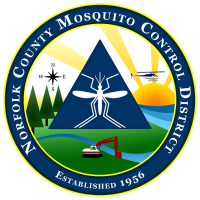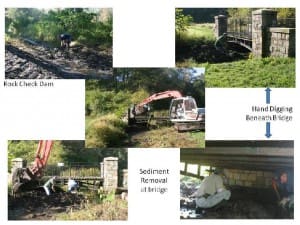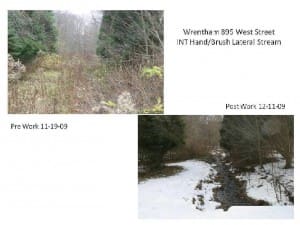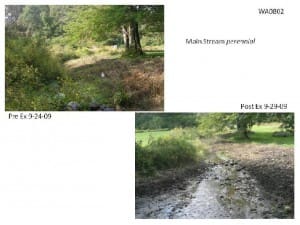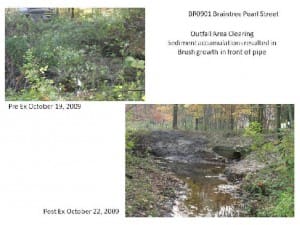How We Operate
Prior to intervention, mosquito larvae may develop within the channel itself or within adjacent flooded areas. In many cases, our water management work can reduce the amount of insecticides used in response to mosquito outbreaks in the surrounding area. We refer to this type of work as source reduction and consider such work to be an important part of an Integrated Mosquito Management (IMM) strategy. Data collection and surveillance measures are important elements of any mosquito IMM strategy. Data collected during insecticide applications is used to aid in the determination of future water management project sites. Our work also extends into salt marshes, known as Open Marsh Water Management (OMWM), where the goal is to restore biodiversity so that natural predators can reduce mosquito populations.
MassGIS (Geographic Information Systems) is used to quickly identify environmental concerns at any given work site early on in the investigation process. When available, Municipal Data such as sewer/utility easements, catch basin and culvert locations, as well as property lot layers assist in project planning.
Ditches are cleaned either by hand or through the use of wide tracked, low ground pressure excavators (Link Belt 1600 or Kobelco SK60). Hand cleaning is accomplished through using shovels, clam rakes, chainsaws, brush cutters and a variety of other hand-held instruments.
Projects are conducted in accordance with the United States Army Corps of Engineers MA General Permit 2010. Please note Mosquito Control in the Maintenance Section and link to USACE Ditching Letter to DEP.
Hand cleaning
Excavator Work
The Trustees of Reservations Francis William Bird Park Property (Walpole, MA).
Upland bank/access road off of Pearl Street (Braintree, MA).
Open Marsh Water Management
The NCMCD has been using a salt marsh mosquito control technique called Open Marsh Water Management (OMWM) since 1999. OMWM is applied to salt marshes and the only municipalities within our District with salt marsh are Braintree, Milton, Quincy, and Weymouth. We have completed 10 projects in these 4 municipalities.
OMWM is a technique which alters the marsh surface in a way to provide greater access for small fish, which eat mosquito larvae breeding on the marsh. OMWM can greatly reduce the need for mosquito larviciding on the marsh and reduce the need for spraying in the immediate neighborhoods surrounding OMWM projects. OMWM also can reverse some of the less desirable changes to marshes that were implemented when extensive ditching for mosquito control was initiated in the 1930’s. OMWM can also prevent the encroachment of invasive plants and provide better habitat for waterfowl and other birds.
OMWM is primarily accomplished using track motion excavators that have a very low ground pressure (less than 3.5 pounds per square inch – less than a human foot). Material that is excavated to create reservoirs for fish or to create new effective ditches may then be used to fill in old ineffective ditches, depressions on the marsh where mosquito larvae breed, or material can be moved off the marsh.
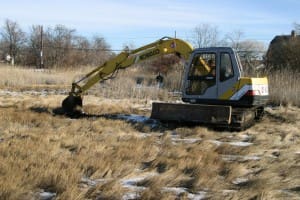 Our low ground pressure excavator working on a salt marsh in Quincy.
Our low ground pressure excavator working on a salt marsh in Quincy.
Legislation Pertinent to Water Management Work
CHAPTER 252. IMPROVEMENT OF LOW LAND AND SWAMPS IMPROVEMENT OF LOW LAND
Chapter 252: Section 1. General provisions
Section 1. If it is necessary or useful (1) to drain or flow a meadow, swamp, marsh, beach or other low land held by two or more proprietors, or (2) to remove obstructions in rivers or streams leading thereto or therefrom, or (3) to eradicate mosquitoes in any area infested thereby, including, in respect to each such purpose, purposes incidental thereto, such improvements may be made as provided in this chapter.
CHAPTER 40. POWERS AND DUTIES OF CITIES AND TOWNS
PURPOSES FOR WHICH TOWNS MAY APPROPRIATE MONEY
Chapter 40: Section 8C. Conservation commission; establishment; powers and duties …No action taken under this section shall affect the powers and duties of the state reclamation board or any mosquito control or other project operating under or authorized by chapter two hundred and fifty-two, or restrict any established public access. Lands used for farming or agriculture, as defined in section one A of chapter one hundred and twenty-eight, shall not be taken by eminent domain under the authority of this section.
Though Mosquito Control Work is exempt from Conservation Commission jurisdiction of the MA Wetlands Protection Act and most projects do not require a 404 Department of Environmental Protection (DEP) Water Quality permit, the Project notifies the Proper DEP Regional Office and Municipal Conservation Commission at least 30 days prior to the start of any work. We are open to, and appreciate any comments, concerns and information and will conduct site visits upon request with local agents. We also encourage Conservation Commissions to request specific work in on behalf of their member municipality.
Contact Water Management
NOTE: Please do not use this form to make requests for mosquito treatments. Those requests can be made here
